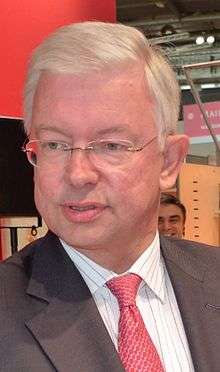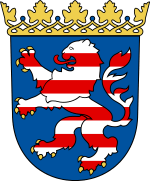Roland Koch
| Roland Koch | |
|---|---|
 Roland Koch, 2008 | |
| Minister President of Hessen | |
|
In office 7 April 1999 – 31 August 2010 | |
| Preceded by | Hans Eichel |
| Succeeded by | Volker Bouffier |
| Personal details | |
| Born |
24 March 1958 Frankfurt am Main, West Germany |
| Nationality | German |
| Political party | CDU |
| Alma mater | Goethe University Frankfurt |
| Occupation | Jurist |
| Religion | Roman Catholic |
| Website |
www |
Roland Koch (born 24 March 1958) is a German jurist and former conservative politician. He was the 7th Minister President of Hesse from 7 April 1999, immediately becoming the 53rd President of the Bundesrat, completing the term begun by his predecessor as Minister President, Hans Eichel, until his resignation on 31 August 2010. On 29 October 2010, he was announced as designated chief executive officer of Bilfinger Berger, Germany’s second-largest builder.[1]
Life and career
Koch was born in Frankfurt am Main. In 1979, Koch became the youngest person to hold the office of chairmain of the CDU in Main-Taunus district. From 1983 until 1987 he was vice-chair of the federal youth organization of the CDU. In 1985 he completed his studies to become a lawyer.
Until 1993 Koch was a city council member in his hometown of Eschborn. He was also a member of the Main-Taunus district council and parliamentary leader of the local CDU group from 1989 until 1997. In 1987 he got elected to the legislature of Hessen, where he became vice-chair of the CDU parliamentary group in 1991 and in 1993 its chair. Since 1998 he has also been chair of the Hessian state party.
Koch is seen as a rhetorically gifted politician; critics have accused him of populism.[2] In the state elections in 1999, the CDU began collecting signatures to document the resistance in the population to plans of the federal government to make dual citizenship easier for foreigners to obtain. Because some people viewed this action as "collecting signatures against foreigners", they tried to portray this campaign as "xenophobic".[3] Koch was able to win the election and displace the incumbent, Hans Eichel.
In November 2006 Koch was elected vice-chairman of the CDU.
Prior to the Hesse state election of 2008 Koch was once again accused of using xenophobic tactics by pledging to get tough on youth crime, which is concentrated among immigrant and minority groups. In the course of the election he lost his party's majority in the Hessian Parliament, but remained acting Minister President as his SPD challenger Andrea Ypsilanti was unable to form a government.
Since none of the parties was able to build a majority coalition, they decided to give the voters another chance to produce a workable result. In the January 2009 election the FDP made significant gains which allowed Koch to form a conservative-liberal coalition government, reelecting him as the Minister President of the State of Hesse.
On 25 May 2010 Koch announced his withdrawal from the political scene. He resigned as Minister-President of Hesse on 31 August 2010.[4] He hinted that he was departing politics in order to become active in the business world.[5]
His father Karl-Heinz Koch was also a politician in Hessen. Koch and his wife Anke have two sons. He is a Roman Catholic.[6]
References
- ↑ Donahue, Patrick (October 29, 2010). "Bilfinger Names Koch CEO After the Merkel Ally Quits Politics". BusinessWeek.
- ↑ Sueddeutsche Zeitung online "Most brutal populism" - Hesse Prime Minister Roland Koch faces a spate of criticism on his statements about foreign teenage criminals
- ↑ Rhein Zeitung online
- ↑ Liveticker: Die Pressekonferenz zum Koch-Rückzug from fr-online.de, 25 May 2010 (downloaded on 25 May 2010)
- ↑ Koch tritt zum 31. August als Ministerpräsident zurück (Live-Ticker) from ft.de, 25 May 2010
- ↑ Bundesrat Roland Koch
External links
| Wikimedia Commons has media related to Roland Koch. |
| Political offices | ||
|---|---|---|
| Preceded by Hans Eichel (SPD) |
Minister-President of Hesse 1999–2010 |
Succeeded by Volker Bouffier (CDU) |

